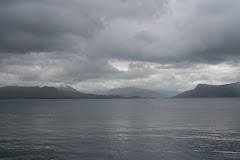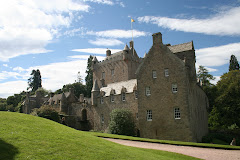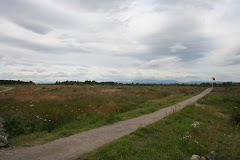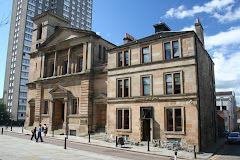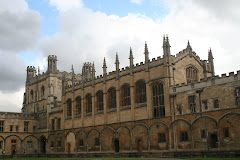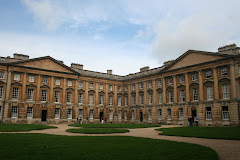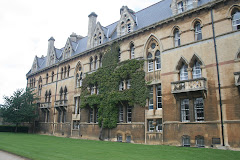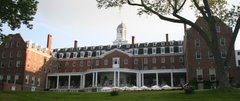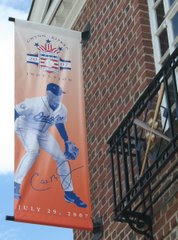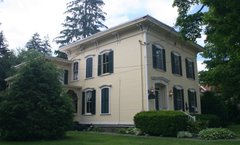For the record -- I did it, I did it, I did it. I played a tune from start to finish on, not the practice chanter, but the highland bagpipe. After some bagpipe adjustments by the ever skillful Stuart Liddell -- he shortened the tongue of my outside tenor drone (to require less air) and bent the fibers on the cane reed in my pipe chanter (again, to require less air) -- and some able coaching regarding breathing and arm pressure on the bag technique from the same Mr. Liddell, I played Bonnie Galloway. I repeated it to assure teacher and student alike that it wasn't a once in a lifetime cosmic fluke. They do happen. This wasn't one of them. I did it. Perhaps there is musical grace now and again.
Granted, my strike-ins and sound-offs need some polishing. That's what practice is for. But, I did it.
I truly felt like a little kid whose training wheels have been removed from his bicycle for the very first time as well as his father's hand from the rear of the seat. I know the extra wheels are gone. I helped take them off. My balance is a little wobbly, but I am not falling over. I look back to make sure that a gentle hand is keeping me up and on track. It was there when I started. It's not there now. It was scary at first. A touch of astonishment was present as well. It was one of those "Am I really doing this?" moments. What fun. I think I may have experienced something akin to giddiness. Is that possible?
I will stick with slow airs and 4/4 marches for the near future, but I have my heart set on some jigs and reels. One day. One day.
That's it for the moment. Peace.
Friday, June 29, 2007
Thursday, June 28, 2007
Shenandoah Pipe School, Part II
The instructors' concert was this evening at Millbrook High School. It was good to see so many Presbyterians in the audience.
The show was remarkable. It is inspiring to see a challenging instrument played with such precision and virtuosity. Stuart Liddell, a lead piper with Simon Fraser University in British Columbia, Canada and world piping champion, was clearly the star of the evening. He played one of the fastest and most multi-parted hornpipes I believe I have ever heard. Stuart has played at Carnegie Hall and now he can add Millbrook Auditorium to his list of performance venues. If you happen to be interested in very good recordings of traditional pipe music, the SFU band is one of the finest. I have added a link to their site in my "Links Worth Visiting." Scroll down. You will see it.
Tomorrow is the last day of pipe school. I have learned a lot. I am acutely aware of where my attention in practice needs to be placed, which really is a good thing. Step one toward improving in anything is a sober assessment of what you can do and what you can't do. As much as exercises on pipe music embellishments bore me to tears, I will do them. I prefer tunes, however. That day, in time, will come.
I said I would post my reading list for next week. Here it is. I have kept it intentionally light in order to take notes and absorb the material. Since I have spent the past two weeks studying music -- guitar one week, the bagpipe the other -- I have decided to continue the theme. I will be reading Greg Scheer's The Art of Worship: A Musician's Guide to Leading Modern Worship. Scheer is a music associate with Calvin College and Seminary's Calvin Institute of Christian Worship in Grand Rapids, MI. The chapter titles of the book will give you a sense of Scheer's perspective: "Setting the Stage;" "Assembling the Team;" "Planning Worship;" "Making Music;" "Timeless Hymns in a Contemporary Context;" "Rehearsing and Leading;" and "Looking to the Future."
The other book I will be reading is by Lajos Egri. The title is The Art of Dramatic Writing: Its Basis in the Creative Interpretation of Human Motives. The book was first published in 1942. Egri, originally from Hungary, founded the Egri School of Writing in NYC in the 1930s. This text is one of the required texts for the writing class I will be taking at Christchurch College, Oxford in July.
That's it for the moment. Peace.
The show was remarkable. It is inspiring to see a challenging instrument played with such precision and virtuosity. Stuart Liddell, a lead piper with Simon Fraser University in British Columbia, Canada and world piping champion, was clearly the star of the evening. He played one of the fastest and most multi-parted hornpipes I believe I have ever heard. Stuart has played at Carnegie Hall and now he can add Millbrook Auditorium to his list of performance venues. If you happen to be interested in very good recordings of traditional pipe music, the SFU band is one of the finest. I have added a link to their site in my "Links Worth Visiting." Scroll down. You will see it.
Tomorrow is the last day of pipe school. I have learned a lot. I am acutely aware of where my attention in practice needs to be placed, which really is a good thing. Step one toward improving in anything is a sober assessment of what you can do and what you can't do. As much as exercises on pipe music embellishments bore me to tears, I will do them. I prefer tunes, however. That day, in time, will come.
I said I would post my reading list for next week. Here it is. I have kept it intentionally light in order to take notes and absorb the material. Since I have spent the past two weeks studying music -- guitar one week, the bagpipe the other -- I have decided to continue the theme. I will be reading Greg Scheer's The Art of Worship: A Musician's Guide to Leading Modern Worship. Scheer is a music associate with Calvin College and Seminary's Calvin Institute of Christian Worship in Grand Rapids, MI. The chapter titles of the book will give you a sense of Scheer's perspective: "Setting the Stage;" "Assembling the Team;" "Planning Worship;" "Making Music;" "Timeless Hymns in a Contemporary Context;" "Rehearsing and Leading;" and "Looking to the Future."
The other book I will be reading is by Lajos Egri. The title is The Art of Dramatic Writing: Its Basis in the Creative Interpretation of Human Motives. The book was first published in 1942. Egri, originally from Hungary, founded the Egri School of Writing in NYC in the 1930s. This text is one of the required texts for the writing class I will be taking at Christchurch College, Oxford in July.
That's it for the moment. Peace.
Wednesday, June 27, 2007
Shenandoah Pipe School
Three lessons a day plus three hours of practice daily with a workshop thrown in for good measure leaves one with little breathing room, which is important when it comes to the highland bagpipes. I must have an odd Calvinistic gene that compels me to take up pursuits that require disciplining the mind and body alike over a period of years only to fall considerably short of anything that resembles perfection. If only musical grace were as bountiful as spiritual grace. What is gained musically is earned through hard work.
My sight reading continues to need work. My brain recognizes what the notes represent. Getting my fingers to follow along happens sporadically at best. My chanter technique is improving daily. I am still mystified as to how to keep pressure on the bag with my arm, replenish the bag's air with my lungs without passing out, and play a tune in time all at once. The instructors assure me that it comes in time, much like riding a bicycle. Once I have it I will have it. I have to trust them on this. At the moment, it is not apparent.
So far, my small group of students has been introduced to a 4/4 march, a 3/4 retreat march, a 6/8 march, a jig, a reel, and a strathspey. The strathspey is unique to traditional Scottish music. It is music designed with dancers in mind. The unembellished notes are punched, which gives the music its drive. The timing is 4/4, but rhythmically a lot more is going on. The pattern is one of held and cut, cut and held notes that gives so much Celtic music its flavor.
We were also introduced to Piobaireachd [pronounced Pee-brock] music, which is Scottish classical music. Piobaireachd begins with a theme, which is embellished and elaborated upon through the course of numerous movements. Piobreachd tunes fall in the categories of salutes, laments, and gatherings. The laments are particularly attractive and quite haunting. One of the nice features of the Shenandoah Piping School is the daily recitals presented by members of the faculty.
As I pursue piping I have to remind myself that it's the journey rather than the destination that matters most. There are some places with this instrument at which I will never arrive. Admitting to limitations is never easy. However, I plan to keep taking steps forward.
Next week I will be on the Carolina coast with a stack of books by my side. I have not mapped out my reading list exactly. I intend to do so before we set out for the beach on Saturday. When I do I will post it. We will be in South Nags Head between mileposts nineteen and twenty. We are in the phonebook. If you are at the beach and wish to say hello, give us a call. We'd love to see you.
That's it for the moment. Peace.
My sight reading continues to need work. My brain recognizes what the notes represent. Getting my fingers to follow along happens sporadically at best. My chanter technique is improving daily. I am still mystified as to how to keep pressure on the bag with my arm, replenish the bag's air with my lungs without passing out, and play a tune in time all at once. The instructors assure me that it comes in time, much like riding a bicycle. Once I have it I will have it. I have to trust them on this. At the moment, it is not apparent.
So far, my small group of students has been introduced to a 4/4 march, a 3/4 retreat march, a 6/8 march, a jig, a reel, and a strathspey. The strathspey is unique to traditional Scottish music. It is music designed with dancers in mind. The unembellished notes are punched, which gives the music its drive. The timing is 4/4, but rhythmically a lot more is going on. The pattern is one of held and cut, cut and held notes that gives so much Celtic music its flavor.
We were also introduced to Piobaireachd [pronounced Pee-brock] music, which is Scottish classical music. Piobaireachd begins with a theme, which is embellished and elaborated upon through the course of numerous movements. Piobreachd tunes fall in the categories of salutes, laments, and gatherings. The laments are particularly attractive and quite haunting. One of the nice features of the Shenandoah Piping School is the daily recitals presented by members of the faculty.
As I pursue piping I have to remind myself that it's the journey rather than the destination that matters most. There are some places with this instrument at which I will never arrive. Admitting to limitations is never easy. However, I plan to keep taking steps forward.
Next week I will be on the Carolina coast with a stack of books by my side. I have not mapped out my reading list exactly. I intend to do so before we set out for the beach on Saturday. When I do I will post it. We will be in South Nags Head between mileposts nineteen and twenty. We are in the phonebook. If you are at the beach and wish to say hello, give us a call. We'd love to see you.
That's it for the moment. Peace.
Saturday, June 23, 2007
More from Maryville
Bluegrass musicians are incredibly friendly, humorous people. Tony McManus, one of the instructors and performers at the camp I attended this week, is from Paisley, Scotland. He had numerous jokes about some of the proclivities of his motherland, namely its emotional aloofness and its notorious stinginess. These are his jokes, not mine. Any offense given to persons of Scottish ancestry is understandable and should probably be taken if it helps.
There was a man in Paisley who loved his wife so much he almost told her.
There was another man in Paisley who took his children each and every Christmas to see Santa's grave.
Tony is noted as a very talented fingerstyle and flatpicker guitarist in the Celtic tradition. If you are a fan of the acoustic guitar, I recommend his Ceol More CD. It is one of his more recent recordings. I listened to it countless times on my longish drive from Maryville back to Winchester today.
Invariably, when bluegrass musicians get together they tell banjo and banjo player jokes. Banjos and banjo players are easy marks. Here are some of my favorites.
What do you call a banjo player without a girlfriend?
Homeless.
What do you call a pretty woman on a banjo player's arm?
A tattoo.
St. Peter was having a monotonous day at the pearly gates. He decided to ask some new and different questions of the prospective entrants. He asked the next three persons in line to tell him their annual incomes. The first two persons incomes were sizable. "Ah," Peter noted, "must be hardworking professionals." The third person reported a rather meager sum. So, Peter asked him, "What kind of banjo did you play?"
This coming week I am changing gears. I move from using my fingertips to the pads of my fingers. I am at Shenandoah's piping school. I am hoping it gives me a head start on my week at the National Piping Centre in Glasgow in July.
That's it for the moment. Peace.
There was a man in Paisley who loved his wife so much he almost told her.
There was another man in Paisley who took his children each and every Christmas to see Santa's grave.
Tony is noted as a very talented fingerstyle and flatpicker guitarist in the Celtic tradition. If you are a fan of the acoustic guitar, I recommend his Ceol More CD. It is one of his more recent recordings. I listened to it countless times on my longish drive from Maryville back to Winchester today.
Invariably, when bluegrass musicians get together they tell banjo and banjo player jokes. Banjos and banjo players are easy marks. Here are some of my favorites.
What do you call a banjo player without a girlfriend?
Homeless.
What do you call a pretty woman on a banjo player's arm?
A tattoo.
St. Peter was having a monotonous day at the pearly gates. He decided to ask some new and different questions of the prospective entrants. He asked the next three persons in line to tell him their annual incomes. The first two persons incomes were sizable. "Ah," Peter noted, "must be hardworking professionals." The third person reported a rather meager sum. So, Peter asked him, "What kind of banjo did you play?"
This coming week I am changing gears. I move from using my fingertips to the pads of my fingers. I am at Shenandoah's piping school. I am hoping it gives me a head start on my week at the National Piping Centre in Glasgow in July.
That's it for the moment. Peace.
Thursday, June 21, 2007
Maryville, TN
Here is a day in the life of a guitar camper at Steve Kaufman's Acoustic Kamp. Steve Kaufman is the three-time National Flatpkicking Champion. The only one in the history of the award. Other guitarists have won it twice, but no one has won it three times.
Breakfast begins at 7:30 a.m. and is served through 9:00 a.m. The late serving time is to accommodate all of the pickers who stayed out too late the night before picking and grinning into the wee hours. The lodging and food is decent for college campus fare. It is ample and satisfying. Maryville College, by the way, is one of the small liberal arts college gems of the Presbyterian Church (USA). The campus, which dates back to 1819, is stately with architecturally attractive buildings that cannot be mistaken for anything other than halls of learning. The campus is a half hour outside of Knoxville with a commanding view of the Smoky Mountains on the near horizon.
After breakfast, there is a morning jam session in a breezeway between the campus' Fine Arts Center and Music Hall. It is a sight to behold. Literally, dozens of groups of banjos, fiddles, guitars, and mandolins playing one tune.
There are two formal classes each day, both of which are two hours. One is from 10:00 a.m. to 12 noon. The other is from 2:00 p.m. to 4:00 p.m. The classes have ranged from the highly theoretical and technical to the very practical. My head and hands hurt. But it is a blissful pain. Before dinner, the jam sessions resume.
Each evening there is a concert in the chapel. The instructors are the performers. The concerts have ranged from traditional folk to bluegrass to acoustic jazz to Texas swing. My favorite instructors so far have been Beppe Gambetta of Genoa, Italy (I had a small master class -- eight students only -- with him. I added a link to his site for fans of the acoustic guitar) and Adam Granger. Granger is the guitarist for The Guys All Star Shoe Band of Priarie Home Companion Fame. He, of course, is from Minneapolis. After the concert, which ends ordinarily at 10:30 p.m., as you might well imagine, there are more jam sessions.
The campers are from all over the country with a smattering of persons from Europe and Asia. The ages range from middle school into the twilight years.
I have learned enough over this week to keep me busy at the guitar for a decade or more.
I appreciate the occasional posts by some of you who have been following my narrative. Please know that I read them.
That's it for the moment. Peace.
Breakfast begins at 7:30 a.m. and is served through 9:00 a.m. The late serving time is to accommodate all of the pickers who stayed out too late the night before picking and grinning into the wee hours. The lodging and food is decent for college campus fare. It is ample and satisfying. Maryville College, by the way, is one of the small liberal arts college gems of the Presbyterian Church (USA). The campus, which dates back to 1819, is stately with architecturally attractive buildings that cannot be mistaken for anything other than halls of learning. The campus is a half hour outside of Knoxville with a commanding view of the Smoky Mountains on the near horizon.
After breakfast, there is a morning jam session in a breezeway between the campus' Fine Arts Center and Music Hall. It is a sight to behold. Literally, dozens of groups of banjos, fiddles, guitars, and mandolins playing one tune.
There are two formal classes each day, both of which are two hours. One is from 10:00 a.m. to 12 noon. The other is from 2:00 p.m. to 4:00 p.m. The classes have ranged from the highly theoretical and technical to the very practical. My head and hands hurt. But it is a blissful pain. Before dinner, the jam sessions resume.
Each evening there is a concert in the chapel. The instructors are the performers. The concerts have ranged from traditional folk to bluegrass to acoustic jazz to Texas swing. My favorite instructors so far have been Beppe Gambetta of Genoa, Italy (I had a small master class -- eight students only -- with him. I added a link to his site for fans of the acoustic guitar) and Adam Granger. Granger is the guitarist for The Guys All Star Shoe Band of Priarie Home Companion Fame. He, of course, is from Minneapolis. After the concert, which ends ordinarily at 10:30 p.m., as you might well imagine, there are more jam sessions.
The campers are from all over the country with a smattering of persons from Europe and Asia. The ages range from middle school into the twilight years.
I have learned enough over this week to keep me busy at the guitar for a decade or more.
I appreciate the occasional posts by some of you who have been following my narrative. Please know that I read them.
That's it for the moment. Peace.
Wednesday, June 13, 2007
Cooperstown
The village is named for its founder, William Cooper, the father of American author James Fenimore Cooper. The chamber of commerce's tag line is "America's Most Perfect Village." I concur.
It's very small, less than 2,000 persons. It sits on the shore of Otsego Lake (pronounced Ott -- as in hot -- say go) in the rolling hills of New York's Leatherstocking District. The Adirondacks are to the north, the Catskills to the east, the Finger Lakes to the west. The Otsego is the headwaters of the Chesapeake Bay watershed. The Susquehanna River, which flows from the Otsego, barely qualifies as a stream in Cooperstown. James Fenimore Cooper described Otsego quite eloquently in The Deerslayer. He uses the phrase "glimmerglass" to capture the lake's essential appearance.
I stayed at the Barnwell Inn, which is within walking distance of everything. Given the size of the village, everything is within walking distance of everything. The Barnwell Inn, a bed and breakfast run by two of the nicest people you would ever want to meet, Mark and Tara Barnwell (long time friends of Rossi Selzer), is in the new part of Cooperstown. The new part was built in the middle of the 19th century. Anything built after 1800 is considered new. The old part of the village nestles close to the lakeshore and dates from the early 18th century.
For the golfers, I was able to play 18 on Monday evening on the Leatherstocking Golf Course. The course is part of the Otesaga Resort. I don't know the date of the resort. The course was built in 1909.
I would be remiss if I didn't mention the food at the inn. Mark is a superb cook. Breakfast on Tuesday and Wednesday morning consisted of a casserole, a fruit cobbler, and fresh fruit, juice, and coffee. The Wednesday breakfast was my favorite. The casserole was egg, spinach, feta cheese, and fresh tomatoes.
The inn has a well-stocked library. I especially enjoyed The Canterbury School yearbooks. There on the third row, at the end, in Father Maurais' third grade class, stood young Rossi Stanton in her neatly pressed private school plaid jumper. I had trouble discerning whether the expression on her face was pious or quizzical.
The Baseball Hall of Fame is a sizeable structure with a well-displayed and extensive collection. I've known of the Hall of Fame's existence and its place in the game's history, lore, and mythology for all of my adulthood and most of my childhood. It could have failed to live up to considerably high and overblown expectations. It did not.
I took my time and read each and every exhibit carefully. My head is now more full of baseball trivia than you can or should imagine. The baseball history time line was impressive. It set baseball in the context of stick and ball games played in other cultures from around the world. Evidently, we humans have been throwing and catching balls and swinging sticks at them for a very long time. The museum effectively draws a line between baseball and the young, emerging nation in whose soil the game grew forth and bore fruit.
A word about baseball's origins. Evidently, the local boys played something called "town ball" in a pasture where Doubleday Field, home of the annual Hall of Fame Game, now stands. Abner Doubleday, local boy, West Point graduate, and Civil War hero, modified the game to include a diamond and bases, thus the name "baseball." Spalding, the sporting goods magnate, appointed a commission to determine the origins of baseball once and for all. His commission concluded the game was indeed invented by Doubleday in Cooperstown in 1839. In fairness, you should know that there are other stories that suggest forms of "baseball" were being played far and wide in our young republic in the decade prior to 1839.
Favorite quote from the museum: "The secret to managing a baseball club is keeping the players who hate your guts away from the ones who are undecided." Casey Stengel, Manager, New York Yankees.
Peace,
It's very small, less than 2,000 persons. It sits on the shore of Otsego Lake (pronounced Ott -- as in hot -- say go) in the rolling hills of New York's Leatherstocking District. The Adirondacks are to the north, the Catskills to the east, the Finger Lakes to the west. The Otsego is the headwaters of the Chesapeake Bay watershed. The Susquehanna River, which flows from the Otsego, barely qualifies as a stream in Cooperstown. James Fenimore Cooper described Otsego quite eloquently in The Deerslayer. He uses the phrase "glimmerglass" to capture the lake's essential appearance.
I stayed at the Barnwell Inn, which is within walking distance of everything. Given the size of the village, everything is within walking distance of everything. The Barnwell Inn, a bed and breakfast run by two of the nicest people you would ever want to meet, Mark and Tara Barnwell (long time friends of Rossi Selzer), is in the new part of Cooperstown. The new part was built in the middle of the 19th century. Anything built after 1800 is considered new. The old part of the village nestles close to the lakeshore and dates from the early 18th century.
For the golfers, I was able to play 18 on Monday evening on the Leatherstocking Golf Course. The course is part of the Otesaga Resort. I don't know the date of the resort. The course was built in 1909.
I would be remiss if I didn't mention the food at the inn. Mark is a superb cook. Breakfast on Tuesday and Wednesday morning consisted of a casserole, a fruit cobbler, and fresh fruit, juice, and coffee. The Wednesday breakfast was my favorite. The casserole was egg, spinach, feta cheese, and fresh tomatoes.
The inn has a well-stocked library. I especially enjoyed The Canterbury School yearbooks. There on the third row, at the end, in Father Maurais' third grade class, stood young Rossi Stanton in her neatly pressed private school plaid jumper. I had trouble discerning whether the expression on her face was pious or quizzical.
The Baseball Hall of Fame is a sizeable structure with a well-displayed and extensive collection. I've known of the Hall of Fame's existence and its place in the game's history, lore, and mythology for all of my adulthood and most of my childhood. It could have failed to live up to considerably high and overblown expectations. It did not.
I took my time and read each and every exhibit carefully. My head is now more full of baseball trivia than you can or should imagine. The baseball history time line was impressive. It set baseball in the context of stick and ball games played in other cultures from around the world. Evidently, we humans have been throwing and catching balls and swinging sticks at them for a very long time. The museum effectively draws a line between baseball and the young, emerging nation in whose soil the game grew forth and bore fruit.
A word about baseball's origins. Evidently, the local boys played something called "town ball" in a pasture where Doubleday Field, home of the annual Hall of Fame Game, now stands. Abner Doubleday, local boy, West Point graduate, and Civil War hero, modified the game to include a diamond and bases, thus the name "baseball." Spalding, the sporting goods magnate, appointed a commission to determine the origins of baseball once and for all. His commission concluded the game was indeed invented by Doubleday in Cooperstown in 1839. In fairness, you should know that there are other stories that suggest forms of "baseball" were being played far and wide in our young republic in the decade prior to 1839.
Favorite quote from the museum: "The secret to managing a baseball club is keeping the players who hate your guts away from the ones who are undecided." Casey Stengel, Manager, New York Yankees.
Peace,
Thursday, June 7, 2007
Days away
I set off for Cooperstown and the Baseball Hall of Fame on Monday, June 11. I will be staying at the Barnwell Inn. In the yellow room, to be exact.
If you haven't checked out the "Links worth visiting" section of my blog, I suggest you do so. I've included links to places I will be going for my convenience and your perusal. The Hall of Fame site is quite impressive. Virtually, you can get a good sense of the museum's collections. The other sites are equally impressive, most notably the National Piping Centre site.
Here's some shameless adverstising, but for the common good. If you are a fan of or even only mildly interested in traditional Scottish music, mark your calendar for Thursday, June 28 at 7:30 p.m. in the Millbrook High School auditorium. The instructors from Scotland's National Piping Centre for Shenandoah University's Summer Piping School will be presenting a concert of marches, strathspeys, jigs, and reels. The instructors are among the finest bagpipers and drummers in the world. The concert is sponsored by The City of Winchester Pipes and Drums. I am one of their novice pipers. In time, and with a lot of practice, I hope to join their ranks. The cost is $20. For tickets, call Shenandoah University's ticket office at 540-665-4569.
That's it for the moment. Peace.
If you haven't checked out the "Links worth visiting" section of my blog, I suggest you do so. I've included links to places I will be going for my convenience and your perusal. The Hall of Fame site is quite impressive. Virtually, you can get a good sense of the museum's collections. The other sites are equally impressive, most notably the National Piping Centre site.
Here's some shameless adverstising, but for the common good. If you are a fan of or even only mildly interested in traditional Scottish music, mark your calendar for Thursday, June 28 at 7:30 p.m. in the Millbrook High School auditorium. The instructors from Scotland's National Piping Centre for Shenandoah University's Summer Piping School will be presenting a concert of marches, strathspeys, jigs, and reels. The instructors are among the finest bagpipers and drummers in the world. The concert is sponsored by The City of Winchester Pipes and Drums. I am one of their novice pipers. In time, and with a lot of practice, I hope to join their ranks. The cost is $20. For tickets, call Shenandoah University's ticket office at 540-665-4569.
That's it for the moment. Peace.
Subscribe to:
Posts (Atom)
Links worth visiting
- Dan Kimball's website -- Dan is author of The Emerging Church and pastor of Vintage Church, Santa Cruz, CA
- Calvin Church, Zelienople, PA
- Calvin Institue of Christian Worship
- William and Mary's DOG Street Journal
- Brian McLaren's hompage -- author, speaker, activist
- Isabella Stewart Gardner Museum, Boston, MA
- JFK Presidential Library and Museum, Boston, MA
- My writing instructor at Oxford's Summer School
- Homepage for Oxford University's Oxford Experience
- Simon Fraser University Pipe Band
- One of the guitarists with whom I studied in Maryville
- For the bluegrass music fan with details about the bluegrass guitar camp I will be attending
- Montreat: The starting point for hiking western NC's Blue Ridge wilderness
- For citizens of Red Sox Nation
- My home and place of study while in Glasgow, Scotland, UK
- Here's the site of the bluegrass guitar camp in the TN Smokies
- Take a virtual tour of Cooperstown's Baseball Hall of Fame
- Barnwell Inn: My B&B home away from home in Cooperstown, NY
- First Presbyterian Church, Winchester, VA, USA





